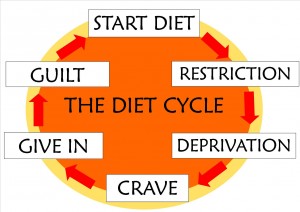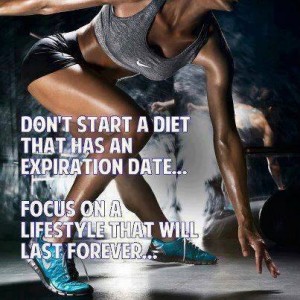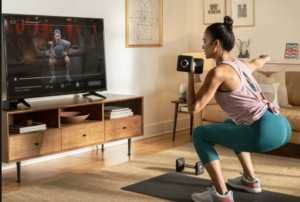So it’s been quite a long time since I’ve written for FRN. I have relocated from London to Dubai with my family. I would very much like to boast that I’ve been tanning by the pool sporting my super toned midriff and going to outdoor nightclubs drinking bubbles….but that is a fiction.
The reality is I’ve been unpacking boxes, doing school runs, carefully debating the merits of Siemens vs Samsung washing machines and wearing baggy clothing as I’ve put on 10kg.
Which got me thinking…I thought I had it nailed with my competition diet and lifestyle change. I thought all those months of eating unprocessed food and doing hours of cardio and weights would give me that amazing body.
I had that amazing body for about a week, and then lost it again when I went back to my ‘normal’ life.
I realised that this diet I was on was just another fad diet. And I hate fad diets. I mean, really hate them.
Quick caveat here – these opinions are my own and I don’t hold any nutrition qualifications.
So, the pitfalls of fad weight loss diets. I won’t name any specific ones as I do not wish to offend (or more importantly, get sued!) but just wanted to touch on two very popular frameworks of 2013 fad diets.
Very Low Calorie Diets
There are many variations of this diet. Some involve fasting, counting calories, points, etc. In very basic terms, not taking into account hormonal functions and other factors, create a caloric deficit (where your calorie intake is less than calorie expenditure) and you should in theory lose weight. This is the basis of most weight loss diets.
Beware of very low-calorie diets, especially if you are active (be it through sport, gym, or your profession).
I feel uncomfortable when I hear women talk about being on sub 1500 calories a day. I’ve heard many women admit to being on 700 calorie a day diets. To put this into perspective – my 1-year-old honestly eats more than this!
Sure you will lose weight by restricting this much, but if you want to achieve that ‘toned’ look, this is often counterproductive as you will be losing a lot of muscle mass as well, not just fat.
You may also feel low energy, have lacklustre skin, irritable moods, and mess around with your hormones. Some women even report that their menstrual cycle can temporarily stop – now that is scary!
This applies to men as well, by the way. There used to be this guy who would religiously come to my Body Pump classes. He would do Spin and Body Pump back to back, then often go and do sport after. He told me he was on fatburner pills, sub 1000 calories a day, and trying for a baby. He just didn’t understand why he felt so terrible, why he wasn’t losing weight and why they were having problems conceiving.
As I mentioned, I am not licensed to give medical or nutritional advice, all I could do was to offer my opinion as a friend and point him in the right research. Thankfully, he eventually realised that good amounts of good food can actually increase your testosterone. I hope he is continuing on the right track.
Meal Replacement Diets
I’m not referring to having a protein shake post workout or for convenience purposes.
I’m referring to those heavily commercialised diets where you eat mostly just their sachet soups and shakes instead of REAL food. Not only can this be very low-calorie, but have you had a look at the list of ingredients?
Genetically modified soy, sunflower oil, potassium chloride, artificial sweeteners and over 20 other things you probably can’t even pronounce.
Yuck. What sounds healthy about that? And even if they use famous people as poster boys and girls for this product, ask yourself:
- Did they really get their physique through using those products? Even if so, are they maintaining that way?
- How much are they being paid to endorse these products?
- If this poster person is an athlete – do you think a low-calorie meal replacement diet is linked to their high performance? If you’ve ever tried going for a run or playing sport whilst on a low-calorie or liquid diet, I bet you didn’t feel so good (or do that well).
Of course, we all know a friend of a friend of a friend who has lost weight using this. “My sister’s boyfriend’s auntie’s pedicurist’s Zumba instructor lost 3 stone eating 3 shakes a day for 3 months!” (No offence to Zumba, I honestly wish I had those moves…)
Guess what? If I give you 3 lettuce leaves a day for a week you’ll lose lots of weight. Now pay me for these lettuce leaves (at a premium as this includes my professional advice).
 But for each of these rare people (remember there are always anomalies), they will be outnumbered by so many others that these fad diets have failed. Those who lose weight, then put on more than they have lost once the diets are over. Those who cannot even adhere to these diets because they are unsustainable long term (this was me).
But for each of these rare people (remember there are always anomalies), they will be outnumbered by so many others that these fad diets have failed. Those who lose weight, then put on more than they have lost once the diets are over. Those who cannot even adhere to these diets because they are unsustainable long term (this was me).
What I find terrifying is that there are people who make money out of selling these products to overweight people and who advise them on what their nutrition should be, even though most of them don’t hold any qualifications.
I wouldn’t mind if it was sound nutrition advice, but if you are told to get the majority of your already low caloric intake from processed shakes and sachets, which you will pay them for, and they will be making a profit out of you, this is incredibly irresponsible.
Ask yourself if they truly have your health interests at heart, or if they just want to make some easy money out of you.
Other Diets
Magazine celebrity detox diets, super clean diets, paleo, ketogenic (very low carb), intermittent fasting, online coaching, there’s so much out there.
And of course some of these will work for certain people. I’m not knocking these at all and there will always be people who get results from this, especially when used in context. But if it is considered extreme for YOU, then it is probably not sustainable and that is really the key.
You shouldn’t have to work your life around a diet, it should fit in with your lifestyle and goals.
The Best ‘Diet’
 This may sound overly simplified, but how do the majority of people improve their body composition (i.e lose fat) and maintain this long-term?
This may sound overly simplified, but how do the majority of people improve their body composition (i.e lose fat) and maintain this long-term?
By a mixture of eating nutritious single ingredient foods most of the time, combined with strength training and maybe some form of cardio. I say most of the time, because you should still enjoy the foods you love once in a while even if they don’t fit into the single ingredient category. Moderation.
Educate yourself and don’t believe hype.
Remember when eggs were slated for cholesterol and saturated fat? There is so much solid research out there to disprove that eating eggs daily is bad for you.
Remember when we were all crazy about low-fat products? Until we realised that instead of the fat we get chemicals and a whole load of sugar instead. By the way, fat plays a role in brain development, helps to manage inflammation and is vital for hormone production.
And then we started demonising sugar….
Yes, of course, there are healthier alternatives to sugar laden desserts, to greasy take aways and fast food. But if you genuinely enjoy them, then having them once in a while (not everyday, once in a while….) shouldn’t deter from your body composition and performance goals too much.
If you are reading this, you are probably linked in some way to rugby or sport. It is even more important if you do a lot of exercise (for performance reasons or otherwise) that you adequately fuel yourself. Not just in terms of volume of food, but of course quality.
Steer clear of the fad diets and go back to basics. Which takes me nicely onto my next blog, some recipes for easy meals and also desserts.
Sources
Don’t take my word for it – check out these articles by those with real qualifications and experience.
- http://bodytypenutrition.co.uk/blog/quick-fixes-lead-quick-failings/
- http://www.biolayne.com/nutrition/biolayne-video-log-23-is-your-weight-loss-diet-making-you-fatter/
- http://bodytypenutrition.co.uk/blog/life-shakes-herbalife-story/
Stay healthy,
Sandy








 When most people hear the word “Peloton” they think of an expensive black bike with shiny red buttons and that controversial commercial where the husband gifted his wife a Peloton for Christmas.
When most people hear the word “Peloton” they think of an expensive black bike with shiny red buttons and that controversial commercial where the husband gifted his wife a Peloton for Christmas. If the app interests you, Peloton is currently offering a 30 day FREE TRIAL, so why not give it a try? Check it out
If the app interests you, Peloton is currently offering a 30 day FREE TRIAL, so why not give it a try? Check it out 

 This article would not be complete, however, if we did not acknowledge some of the delivery issues that have been plaguing Peloton over the last year. Most of the delivery issues seem to affect U.S. deliveries, however, the UK deliveries have been affected as well.
This article would not be complete, however, if we did not acknowledge some of the delivery issues that have been plaguing Peloton over the last year. Most of the delivery issues seem to affect U.S. deliveries, however, the UK deliveries have been affected as well.








